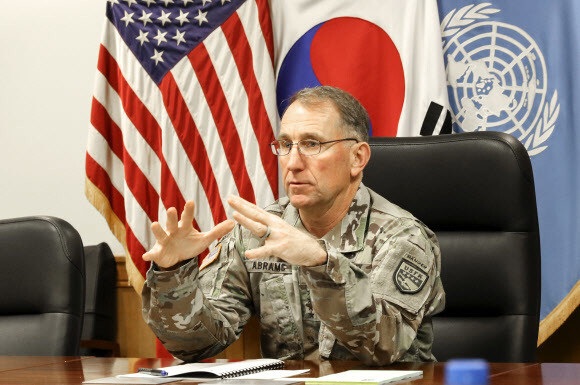Posted on : Nov.15,2019 16:56 KST
Modified on : Nov.15,2019 17:15 KST
 |
|
Robert Abrams, commander of US Forces Korea (USFK), stresses the importance of GSOMIA during a press conference at Camp Humphreys in Pyeongtaek, Gyeonggi Province, on Nov. 12. (provided by USFK)
|
Washington’s demands regarding GSOMIA and USFK costs disregard Seoul as an ally
 |
|
Robert Abrams, commander of US Forces Korea (USFK), stresses the importance of GSOMIA during a press conference at Camp Humphreys in Pyeongtaek, Gyeonggi Province, on Nov. 12. (provided by USFK)
|
South Korea and the US are looking ahead to a very chilly winter. The South Korea-Japan General Security of Military Information Agreement (GSOMIA) is scheduled to terminate at midnight on Nov. 23, and Seoul and Washington are poised to continue their dispute over their respective shares of next year’s US Forces Korea (USFK) defense costs. The mood at the 51st Security Consultative Meeting (SCM) in Seoul on Nov. 15 is expected to be particularly solemn.
Recently, the US has had a number of its senior officials -- including Secretary of Defense Mark Esper, Joint Chiefs of Staff Chairman Gen. Mark Milley, Combined Forces Commander Gen. Robert Abrams, and Assistant Secretary of State for East Asian and Pacific Affairs David Stilwell -- pressing for South Korea to withdraw its decision to end GSOMIA and accept a huge increase in its share of defense costs. It’s a development that is most likely being underpinned by the strong wishes and urgings of President Donald Trump, who would like some results to boast for next year’s presidential election.
But in pushing so relentlessly for a reversal of its ally’s sovereign decision and pressing so hard for a massive increase in its share of defense costs, the US is raising questions about what the alliance is exactly. Amid its carpet-bombing onslaught of expressions of “deep concern and disappointment” over Seoul’s decision to end GSOMIA, there is no way of knowing what resolution efforts it has been making with Japan, the side that brought this whole thing on with its export control measures. The South Korean public is unlikely to accept such demands for Seoul to unilaterally back down without any change in attitude from Tokyo; the end result will only be more anti-US sentiment based on Washington mistreating its ally.
There’s even more widespread indignation over the USFK defense cost sharing issue, where the US seems to be treating its ally like a mere business partner. Even the US’ own experts, progressive and conservative alike, have argued that the Trump administration is “going too far” with its demands, which reports have placed at around to US$5 billion, more than five times the level this year. In South Korea, there has been a consensus from both the ruling and opposition parties. Speaking in confidence, one figure from a Washington think tank said Seoul should “try its best to avoid a large increase all at once in these negotiations,” noting the uncertain prospects for Trump’s re-election next year. In other words, we need to not let the US take us for a ride.
The question of the USFK’s withdrawal or reduction
Another risk is that the defense cost sharing talks could spill over into questions about the withdrawal or reduction of USFK troops. It’s a possibility that cannot be ruled out, with Trump’s hints at a potential USFK withdrawal dating back to the presidential election, where he asked why South Korea wasn’t paying for “100%” of its defense costs. But this doesn’t mean we should go on into fear mode and treat the USFK topic as taboo. South Korea isn’t the only side where controversy is likely to erupt if this becomes a topic of debate. It is also likely to complicate the debate in the US over whether the USFK’s objective is simply “protecting” South Korea, as Trump has suggested, or if it is rooted in the US’ global strategic aims, including reining in China. Trump’s financial logic could also end up taking a hit once people start asking questions about the costs of stationing thousands of US troops in South Korea and in other places such as the continental US or Europe.
The US Congress is also likely to raise strenuous objections. On Nov. 13, I met with Democratic Rep. Adam Smith, chairman of the House Armed Services Committee, and asked him about the possibility of a USFK withdrawal or reductions. Stressing that North Korea is “still a threat,” he firmly maintained that he would oppose it, and that “everyone opposes it as far as I know.” Rep. Eliot Engel, a fellow Democrat and chairman of the House Committee on Foreign Affairs, said the day before that a USFK withdrawal would be “foolish.” At the same time, we should also consider that the USFK cannot remain a constant on the Korean Peninsula forever. Currently standing at around 28,500 troops, the number of USFK forces has consistently fallen amid changes in the international situation since the Korean War.
The Trump administration and the charge he is leading to undermine the alliance requires Koreans to make suitably cool-headed preparations. The US is not the only side feeling “deeply concerned and disappointed.”
By Hwang Joon-bum, Washington correspondent
Please direct comments or questions to [english@hani.co.kr]










